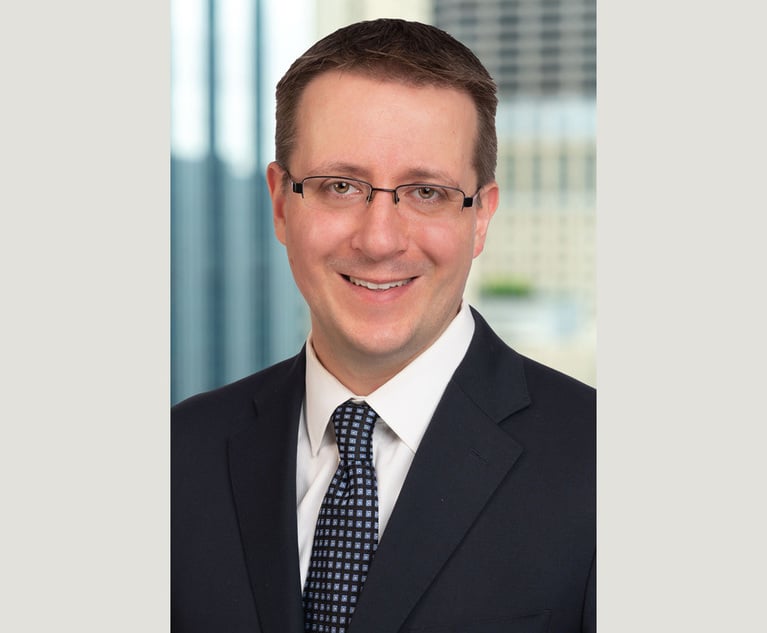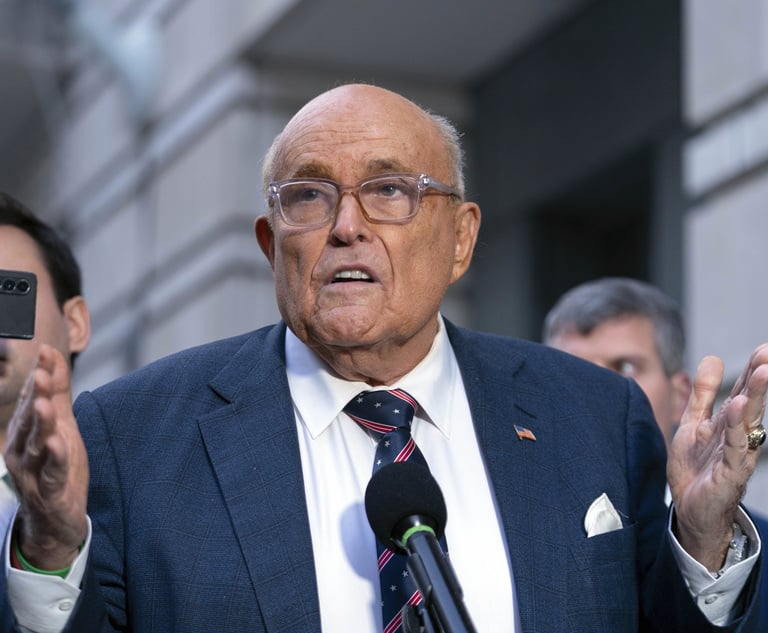Fraud Charges Dropped in ExxonMobil's Climate Change Trial
Exxon attorney Ted Wells, a partner at Paul, Weiss, Rifkind, Wharton & Garrison, was quick to criticize the late concession on fraud charges, and described the remaining contested issue under the Martin Act as trivial.
November 07, 2019 at 03:39 PM
3 minute read
The original version of this story was published on Texas Lawyer
 ExxonMobil world headquarters in Irving, Texas. (Photo: Katherine Welles/Shutterstock.com)
ExxonMobil world headquarters in Irving, Texas. (Photo: Katherine Welles/Shutterstock.com)
New York County Supreme Court Justice Barry Ostrager interrupted a New York assistant attorney general's closing argument after just a few sentences Thursday, stopping him as he began to lay out the state's case that the Texas-based energy company ExxonMobil violated the Martin Act, a state law aimed at protecting shareholders from fraud.
Along with Martin Act violations, the state accused the energy giant of actual and equitable fraud in its complaint, which described a pattern of deception at the company related to how it estimated the effects of climate change and associated regulation on its business.
Ostrager asked assistant attorney general Jonathan Zweig if he intended to concede the actual and equitable fraud charges by discussing only the Martin Act in his closing argument.
Zweig confirmed that the attorney general's office is conceding the fraud charges and spent the next hour arguing that Exxon's shareholders cared how the company quantified the effects of climate change and that Exxon was inconsistent in its use of climate-related financial assumptions.
The company should pay $476 million to $1.6 billion in damages to a shareholder restitution fund, Zweig said.
Exxon attorney Ted Wells, a partner at Paul, Weiss, Rifkind, Wharton & Garrison, was quick to criticize the late concession on fraud charges when Zweig finished his argument.
"They get to say that they just dismissed these claims for strategic purposes," Wells said, asking Ostrager to issue a finding that the claims had to be dismissed due to insufficient evidence.
Ostrager pointed out that he's dismissing the claims with prejudice, but Wells said that won't help Exxon and its current and former leaders who have suffered severe damage to their reputations because of the attorney general's investigation.
He said he expects the attorney general's office to try to litigate the fraud claims in the press, which could lead to more hate mail for Exxon executives.
"The press is here," Ostrager told Wells in the full courtroom, which included rows of journalists. "They've heard what I said. They heard what you said. They understand these claims are no longer part of the case."
Wells said he wanted to do more research, so Ostrager agreed he could submit a posttrial motion.
In his own closing argument, Wells described the remaining contested issue under the Martin Act as trivial. Shareholders didn't care about how Exxon made its cost assumptions for 2030 and 2040, he said, and Exxon didn't release enough information for real economic analysis anyway.
Exxon told shareholders it would apply one type of cost assumption "where appropriate," a qualifier that means the statement cannot be materially misleading, Wells said. Zweig said that defense doesn't hold up for Exxon's Canadian projects in Alberta, where Exxon estimated costs differently even though the effects of climate change were likely to be extremely expensive.
Wells argued that the cost assumptions related only to unfunded projects or concepts, with no effect on the company's financial records.
"Nothing happened, and nobody cared," he said.
Posttrial motions and proposed findings of fact are due Nov. 18, Ostrager told the lawyers.
This content has been archived. It is available through our partners, LexisNexis® and Bloomberg Law.
To view this content, please continue to their sites.
Not a Lexis Subscriber?
Subscribe Now
Not a Bloomberg Law Subscriber?
Subscribe Now
NOT FOR REPRINT
© 2025 ALM Global, LLC, All Rights Reserved. Request academic re-use from www.copyright.com. All other uses, submit a request to [email protected]. For more information visit Asset & Logo Licensing.
You Might Like
View All
An Eye on ‘De-Risking’: Chewing on Hot Topics in Litigation Funding With Jeffery Lula of GLS Capital

Litigators of the Week: A $630M Antitrust Settlement for Automotive Software Vendors—$140M More Than Alleged Overcharges
Trending Stories
- 1How AI Helped a Big Insurer Reduce Legal Costs by $20M
- 2Veritext Legal Solutions Announces the Past Acquisitions of Three Alternative Dispute Resolution Firms
- 3Sarno da Costa D’Aniello Maceri LLC Announces Addition of New Office in Eatontown, NJ, and Named Partner
- 4LSU General Counsel Quits Amid Fracas Over First Amendment Rights of Law Professor
- 5An Eye on ‘De-Risking’: Chewing on Hot Topics in Litigation Funding With Jeffery Lula of GLS Capital
Who Got The Work
J. Brugh Lower of Gibbons has entered an appearance for industrial equipment supplier Devco Corporation in a pending trademark infringement lawsuit. The suit, accusing the defendant of selling knock-off Graco products, was filed Dec. 18 in New Jersey District Court by Rivkin Radler on behalf of Graco Inc. and Graco Minnesota. The case, assigned to U.S. District Judge Zahid N. Quraishi, is 3:24-cv-11294, Graco Inc. et al v. Devco Corporation.
Who Got The Work
Rebecca Maller-Stein and Kent A. Yalowitz of Arnold & Porter Kaye Scholer have entered their appearances for Hanaco Venture Capital and its executives, Lior Prosor and David Frankel, in a pending securities lawsuit. The action, filed on Dec. 24 in New York Southern District Court by Zell, Aron & Co. on behalf of Goldeneye Advisors, accuses the defendants of negligently and fraudulently managing the plaintiff's $1 million investment. The case, assigned to U.S. District Judge Vernon S. Broderick, is 1:24-cv-09918, Goldeneye Advisors, LLC v. Hanaco Venture Capital, Ltd. et al.
Who Got The Work
Attorneys from A&O Shearman has stepped in as defense counsel for Toronto-Dominion Bank and other defendants in a pending securities class action. The suit, filed Dec. 11 in New York Southern District Court by Bleichmar Fonti & Auld, accuses the defendants of concealing the bank's 'pervasive' deficiencies in regards to its compliance with the Bank Secrecy Act and the quality of its anti-money laundering controls. The case, assigned to U.S. District Judge Arun Subramanian, is 1:24-cv-09445, Gonzalez v. The Toronto-Dominion Bank et al.
Who Got The Work
Crown Castle International, a Pennsylvania company providing shared communications infrastructure, has turned to Luke D. Wolf of Gordon Rees Scully Mansukhani to fend off a pending breach-of-contract lawsuit. The court action, filed Nov. 25 in Michigan Eastern District Court by Hooper Hathaway PC on behalf of The Town Residences LLC, accuses Crown Castle of failing to transfer approximately $30,000 in utility payments from T-Mobile in breach of a roof-top lease and assignment agreement. The case, assigned to U.S. District Judge Susan K. Declercq, is 2:24-cv-13131, The Town Residences LLC v. T-Mobile US, Inc. et al.
Who Got The Work
Wilfred P. Coronato and Daniel M. Schwartz of McCarter & English have stepped in as defense counsel to Electrolux Home Products Inc. in a pending product liability lawsuit. The court action, filed Nov. 26 in New York Eastern District Court by Poulos Lopiccolo PC and Nagel Rice LLP on behalf of David Stern, alleges that the defendant's refrigerators’ drawers and shelving repeatedly break and fall apart within months after purchase. The case, assigned to U.S. District Judge Joan M. Azrack, is 2:24-cv-08204, Stern v. Electrolux Home Products, Inc.
Featured Firms
Law Offices of Gary Martin Hays & Associates, P.C.
(470) 294-1674
Law Offices of Mark E. Salomone
(857) 444-6468
Smith & Hassler
(713) 739-1250








